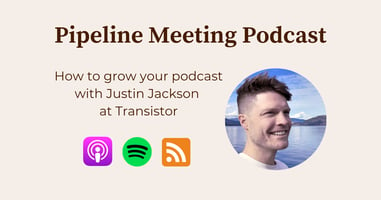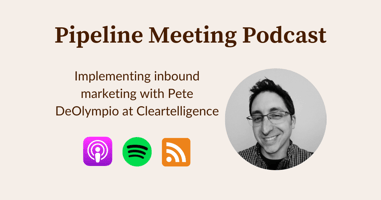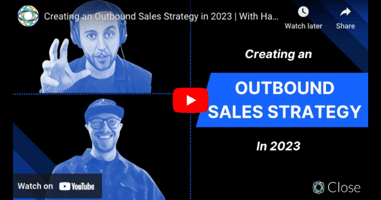Justin Jackson, the co-founder of Transistor, joins for part two of a two-part interview series on...
GPT-3 copywriting for marketing with Richard Lee at SuperCopy
Richard Lee is the CEO and Co-Founder of SuperCopy. He joins the show to talk about how leading marketers are using AI in general—and GPT-3 in particular—for copywriting.
Show Description
Where B2B marketers come to talk sales. 15-minute interviews published every Monday and Wednesday morning. For heads of marketing and founders who support a sales team.
Subscribe
Popular Platforms
Apple Podcasts
Spotify
RSS Feed
Also available:
Amazon • Anghami • Castbox • Castro • Deezer • GoodPods • Google Podcasts • iHeart Radio • Overcast • Pandora • PlayerFM • Pocket Casts • Podcast Index • Podchaser • Stitcher • TuneIn
Show Notes
Justin Jackson is the co-founder of Transistor.fm, the podcast hosting company that hosts this podcast. In part one of our interview series, Justin talks about growing a podcast hosting business.
He talks about their business model as a software company, how they serve podcast agencies, and provide podcast websites. He also takes a step back to provide his perspective on the podcasting industry and market trends.
Justin shares specific insights about the total market, number of active podcasts, and how different platforms compare He specifically contrasts podcasting with the video hosting marketing, looking to YouTube in particular.
Find Justin Jackson on LinkedIn: https://www.linkedin.com/in/justinijackson/
Learn more about Transistor: https://transistor.fm/
Transcript
[00:00:00] Pipeline Meeting Intro
---
[00:00:00] Harris Kenny: Welcome to Pipeline Meeting where marketers come to talk about sales. I'm your host Harris, Kenny, and I'll be joined by guest every Monday and Wednesday for brief 15 minute interviews where we'll share tips that you can apply to support your sales team and help them close more deals.
[00:00:15] Harris Kenny: If you don't have time to listen to this whole episode, you can skip ahead in the show notes in your podcast player, or find the transcript at introcrm.com/podcast. All the episodes are published there.
[00:00:28] How does AI write copy
---
[00:00:28] Harris Kenny: When you say AI, using AI to write copy, what do you mean by that? What? What is AI in this context?
[00:00:35] Richard Lee: In this scenario, AI could be anything, right? We're in the natural language processor world where it's really figuring out what the next word is, like word one, and then what's the next best word for word two, and then what's the best word for word three?
[00:00:48] Richard Lee: And then over and over again, then you have context. Something really crazy happened in the last two years, Open AI created something called GPT-3.
[00:00:54] Richard Lee: Natural language processing has happened for years, it just wasn't super convenient to use and it was just really expensive to get there.
[00:01:01] Richard Lee: Now the costs have gone down a lot lower, people are now using it for other things. But this also opens the door. I feel like it's the same thing with like crypto, right? Like blockchain and crypto technology gets a little more easier to use. Cloud gets a little easier user to. It opens the door to a lot of people to create stuff.
[00:01:16] Richard Lee: That stuff used to require a lot of technical knowledge to start it. But now you don't need that as much.
[00:01:22] Use cases for GPT-3 copywriting
---
[00:01:22] Harris Kenny: What are some example use cases where you feel. Things are working well, cuz I know that I've seen people use AI-driven tools for writing an entire cold email or an entire blog post, and to me it just falls flat.
[00:01:38] Harris Kenny: But I do think there are certain use cases where it's, it is the right tool. What are you seeing with Super Copy? What are your users doing? That stands out to you as really effective?
[00:01:48] Richard Lee: We were such a cockroach startup for three years, the cockroach startup term is like, we just refused to die as a company. We just learned a ton, from the people that we work with.
[00:01:56] Richard Lee: The main demographic we work with in Ranger era was solopreneurs. We understand solopreneur problems to a critical level.
[00:02:04] Richard Lee: And then with Better Sum, we've done client work a ton. And then these clients are usually like, they're doing five mil, 10 mil revenue, right? But that doesn't mean profit.
[00:02:13] Richard Lee: They have marketing spend, and you start realizing what people value. And I'm sure you hear this in the agency. , they value marketing first because that's the thing they understand to a point. And everything else is like, we'll figure out the pieces later, right?
[00:02:26] Richard Lee: Everyone knows you need some kind of marketing. Everyone knows some kind of thing around it. But they, they may not be the best person to do it, but recognizing that is also very difficult.
[00:02:35] Richard Lee: One thing we see in the space for Super Copy that we love doing, so number one, we build from like the best markers perspective. And that is usually very, very, very different from most people on the hobby market.
[00:02:46] Richard Lee: There's a massive skill jump between the best marketers that have like insane flows, understanding, they understand the flow, how everything works. They understand what pain points you have to hit. They understand audience, they understand the differentiating factors. You can't just copy paste.
[00:03:00] Richard Lee: And then every time you have that type of industry, you have a lot of copycats. You have a lot of copycats in marketing that are trying to copy things instead of understanding.
[00:03:10] Richard Lee: They're like, I'm just gonna create social posts. I'm like, cool. You can't just keep writing bad social posts, right? That there's a lot of that. There's a lot of that where they just create posts. They're not looking at the creation being the hard part. They're like, oh, let's create stuff. I'm like, yeah, but you can't create bad stuff over and over again.
[00:03:27] Richard Lee: They believe they could create bad stuff and over again, because they look at bad examples and it's like a telephone game.
[00:03:32] Richard Lee: The way we approach Super Copy is we're building it for the best marketer.
[00:03:34] Richard Lee: AI is a very blunt weapon.
[00:03:37] Richard Lee: It's super powerful, it's like putting a V12 engine in a car, but it's a tricycle. The frame is a tricycle, but a v12, like that's, that happens a lot for a lot of software. You're not giving it much to work with. With AI, if you give it a lot of context, inputs and direction and be very specific about it, it's super powerful.
[00:03:53] Inputs for GPT-3 copywriting
---
[00:03:53] Harris Kenny: My first interaction with using an AI driven tool, I was testing something that wrote cold email and you, it basically used just a single LinkedIn profile. And generated a handful of one line custom, one-liners of custom subject lines.
[00:04:08] Harris Kenny: And to your point, it was such a small amount of data. If you look at someone's LinkedIn profile and really break it down, there's not that much on there really. So what are you referencing where they went to college or something like
[00:04:19] Richard Lee: Yeah.
[00:04:20] Harris Kenny: And what you're talking about, especially from this best marketer's perspective, I feel like is pulling in a lot more data.
[00:04:25] Harris Kenny: So you talk about engagement intelligence.
[00:04:26] Richard Lee: Yeah.
[00:04:27] Harris Kenny: What is engagement intelligence, how does that work?
[00:04:29] Richard Lee: The number one thing that we've noticed the best people do, and this is something we had to do too, was be very specific who you're talking to.
[00:04:36] Richard Lee: This is funny because we see it in our product and we see the engagement and we see it with the clients Before, in previous companies, they literally say the word everybody.
[00:04:45] Richard Lee: They're like, I'm gonna talk to everybody. everybody means no one in this market. It's like the most expensive way to talk to everybody is by talking to everybody.
[00:04:56] Richard Lee: So they'll click on every demographic all at once. In our product, you're, you could click demographics, like, oh, who you are query talking to millennials, but they also click baby boomers. They also click Gen X. They'll click Gen Z. this means nothing now.
[00:05:11] Richard Lee: Number one, we start from the audience. What do the audience care about, what you're saying and what makes sense. What do they want to hear? And that's gonna be your engagement Metric.
[00:05:20] Richard Lee: Number two is what is the thing you're talking about? Is it nurturing your brand? Is it selling a service?
[00:05:26] Richard Lee: If you're marketing, you understand how many of these you post like 90% of this free content that's just there to benefit you, right? Benefit the audience. That five to 8% that's really used to sell something.
[00:05:37] Richard Lee: And then you have your brand. Probably every brand that I've worked with or talked with, their brand book is in a trashcan somewhere, or like on a shelf that's never used.
[00:05:46] Richard Lee: The founders themselves don't use a brand book. Because they spend a lot of money making it. And like, I've seen 30, 40,000 dollar brand books never utilized.
[00:05:54] Richard Lee: How is this supposed to be useful? That's something we want to incorporate. And like, yeah, you spend a lot of time and money and efforts making this very specific. We want you to effectively use it. So we're using ways for people to connect those three parts.
[00:06:07] Richard Lee: A good example is if I'm settling a water bottle.
[00:06:10] Richard Lee: That product is probably one of eight different products that this company sells. It could be just color, right? A good blue water bottle, generic. This blue water bottle has this one lid, right? Most companies will sell that blue water bottle the same way. You can sell the red water bottle.
[00:06:24] Richard Lee: They can say the green water bottles, different lids. They're just gonna talk about it the same way and talk generically to a very broad audience. But that's how marketing is done. That's how marketing's been rewarded. Cause go for quantity. They're like, I'm gonna make 20 posts.
[00:06:38] Richard Lee: You're putting money down, it's gonna do something. It's not great. The best market is what we realized is this specific brand, this specific product or service is going towards this one clientele.
[00:06:48] Richard Lee: And if we could get a higher rate of return with this one clientele, you win. Right. And that's how, that's how we measure and that's how we're building the product.
[00:06:57] Scaling copywriting with AI
---
[00:06:57] Harris Kenny: I could see the counter-argument is, hey, if I have to do more custom messaging for different ICPs, that's gonna take me more time. And that's where you're saying, well, okay, software can help you do that. It can help you niche down.
[00:07:09] Harris Kenny: So it doesn't have to be either throttle your output, so you're only doing one or two posts or make everything super generic. It sounds like you're saying, look, there's this kind of middle, like programmatic middle ground a little bit where you use Super Copy.
[00:07:22] Richard Lee: Exactly.
[00:07:24] Harris Kenny: Interesting. So this maps is something I'm seeing on the outbound side where I'm finding people are using GPT-3 to ask very specific questions and getting much, much better results when doing list building or trying to summarize like large volumes of content.
[00:07:39] Harris Kenny: So for example, asking in GPT-3 to summarize a podcast.
[00:07:43] Richard Lee: Mm-hmm.
[00:07:44] Harris Kenny: is much easier for it to do than asking it to create essentially what a transcript would be for a podcast episode based on a handful of data points. And so I feel like inter, inter, inter interpolating or whatever working within data sets.
[00:07:57] Harris Kenny: So what are the different places that you pull from in your tool in order to get that context? What are the different, do you integrate with different things? Obviously you've got your workflow where you're selecting demographics, but where do you pull from?
[00:08:10] Richard Lee: A lot of people's content online is non-existent. A lot of products and services, maybe there's a page and there's a paragraph maybe attached to it. that's if you've already done all the SEO work already, like you've already packaged it and it works for a specific, marketplace, whether it's like, whether it be like Amazon or like Shopify or X, Y, Z, a lot of the cases they don't even have that. They have maybe a description.
[00:08:33] Richard Lee: we actually let users input everything and we're actually talking with users constantly and be like, what is something you want to copy paste into that will explain this product very well? And the best people will get to utilize all of the inputs right? Because it'll just fill out the story a lot more.
[00:08:49] Richard Lee: That's something we're messing around with a lot. What is your slogan? What are key words you use all the time? What is your catchphrase? What is the thing that you think would make this product connect with your audience more? We allow for that to happen. A lot of inputs makes this type of thing very difficult.
[00:09:04] Richard Lee: There's a reason why people like very simple input and like maybe a tone, because it's simple on the AI to handle it and be consistent --but it can be consistently bad.
[00:09:13] Richard Lee: If you want to have specificity and like be very, very specific and like actually utilize the power of the AI, you need to be very specific and contextual.
[00:09:21] Richard Lee: But doing that's very difficult because the data points start conflicting. Can you be cool and sad? Can you be morbid and happy? Now it's competing with each other, right? Now you have to start figuring out like weight systems.
[00:09:31] Richard Lee: GPT-3 works in a word format. What does 80% happy mean? It doesn't understand what 80% happy means, right? What's a word that means 80% happy? So you have to talk its language as well on top of building other structures and other software and a little other deep learning models that's gonna help build your product out over a longer period of time.
[00:09:52] GPT-3 copywriting use cases
---
[00:09:52] Harris Kenny: Where are you seeing adoption within organizations?
[00:09:54] Richard Lee: We want to make this the ultimate communication co-pilot. So we want to reduce all of the unnecessary aspects of communication, and we also want to provide metrics and data points on like why you're improving a certain way, right?
[00:10:08] Richard Lee: Generative AI is great, but also you've mentioned interloping of the data, how do you use that data to make something a little bit better. That's something we're spending a lot of time on.
[00:10:16] Richard Lee: Based on like the first MVP, we get a lot of interest from people that understand their brand, that understand their product, and they have to deal with multiple versions of it.
[00:10:24] Richard Lee: Larger organizations struggle with this all the time because they may have multiple clients, they have multiple products. And the funny thing is people think they could keep replacing marketers over and over again, but it's very untrue. That's not how things work.
[00:10:37] Richard Lee: I would rather. One or two really good marketers and really good understandings of that brand. Then like 20, like interns. A lot of marketing brands are like, let's get 20 interns. I'm like, yeah, they all don't understand your brand now, and they're all mediocre at best. I'd rather have the two that really get it and then augment them over and over again.
[00:10:57] Richard Lee: Our most mass adoption are from people that understand how to switch brand voices, how to switch the value props. They understand marketing very holistically, and they've actually picked very specific avenues that they thrive in.
[00:11:09] Richard Lee: We've gone to marketing agencies and all the markers, they're like, this would save me 10 hours to 15 hours a week. Now we have to convince the boss. Bosses and marketing agencies don't have the best understanding of technology. They've usually been in the field for like 15, 20 years. They're the ones that don't want to adopt technology as fast. That's something we see.
[00:11:29] Richard Lee: And then in the marketing agency culture, there's still the concept of free internships. Go buy your own software. Go buy your own thing. We're not gonna pay you for three months and then we're gonna vet you.
[00:11:39] Richard Lee: That culture is still very predominant. So we try to avoid those type of organizations primarily because they're just gonna nickel and dime every aspect. We go towards people that can make a decision today. So like solopreneurs or marketers, they're very client driven.
[00:11:52] Richard Lee: They see the need and they see brand voice, they see that holistically all the time. Like, here's a brand deck. Cool, I can now transcribe the brand deck into something that I could redo. We've seen people cut down their marketing time from 20 hours a week to two using our software.
[00:12:06] Richard Lee: Then we see a lot of large organizations wanting to use us that cannot afford to hire another contractor. We actually just got Auburn University as a client. Yeah. Because they have a very specific brand. But if you look at every college, there's maybe one or two marketers for that college.
[00:12:22] Richard Lee: If you notice a lot of universities, they're in the middle of nowhere. So you can't really hire talent nationally, unless it's remote. And they don't really love that remote culture like we want you at University/ College.
[00:12:32] Richard Lee: And they're like, well, all we could really do is augment our two or one or two marketers with interns. They're also shifting out every four months, six months. So that doesn't help them because once they get a good one, you're gonna leave eventually.
[00:12:44] Richard Lee: So all of these people are stressed out. They're like, I need to do internal marketing for our internal events. I need to do external marketing for external stuff. And if we, even if we save you two, three hours a month, you already paid for the software.
[00:12:55] Richard Lee: And now your job is how can I be more creative, augmented by technology. I'm not going for your job. I have no intentions of this product replacing people. I have the intentions of augmenting the best marketers on the team to do their job better and also less stressed out and have less burnout, which we see that consistently.
[00:13:11] Richard Lee: Marketers will get a call at 10:00 PM, Hey, can you do this post for me? And it's due in an hour and a half. That's a true story we see all the time because their clients are like ravish. They're like, oh, we need this now. I'm like, yeah, that's not helpful.
[00:13:23] Richard Lee: So we wanna limit burnout. We wanna help the best marketers do their job better and all that. I think that's our big focus, how can we get people to a place where they could be more creative?
[00:13:33] Improving engagement with AI
---
[00:13:33] Harris Kenny: What's one thing we didn't cover?
[00:13:34] Richard Lee: I think the funny thing is I think people think marketing is very crowded. I would say 85 to 90% of marketing is just bad. It's crowded because there's 90% of just bad people, like they're bad actors. Like you're propagating bad marketing.
[00:13:50] Richard Lee: The funny thing is if you go on any million plus subscriber, like Instagram account, that's a really big brand, they have probably the lowest engagement and the lowest like ratio you could ever see.
[00:14:02] Richard Lee: A beer brand like Budweiser, right? They might have maybe 400 likes on a post, but you have 1.5 million followers. That's a horrible rate of engagement and they're probably paying top dollar for those sexy, really nice posts, captions that are beautiful, it's not doing the job.
[00:14:18] Richard Lee: No one's commenting, no one's engaging with you. It might look good on a brand book, but it's horrible like what you're trying to do. We see that a lot on scale and we see the second wave of things happening.
[00:14:29] Richard Lee: People are gonna be very specific, people are gonna be nicheing down. People are gonna have higher levels of engagement that's gonna come from people that matter, not bots. So Creativity's gonna have it is gonna have a premium in the future. And technology's gonna allow that premium to grow up a little bit more.
[00:14:42] Harris Kenny: Where can people follow Super Copy? Where can people follow you online? Where can people get more info?
[00:14:48] Richard Lee: Yeah. Yeah. Our Instagram, supercopy.ai, I plan on giving away like 95% of the content being completely free. That's gonna be useful training in the marketing space. We believe in content, all organic content providing value.
[00:15:02] Richard Lee: You can follow us on LinkedIn. I'm on, I'm active on LinkedIn. Um, and you could check us out on supercopy.io, as in I will be switching to AI very soon.
[00:15:09] Pipeline Meeting Outro
---
[00:15:09] Harris Kenny: That's all for now. You can find show notes at intro crm.com/podcast. The theme music for Pipeline Meeting is by Neighbourhood Vandal. If you learned something, consider sharing this show with a friend. Thanks for listening.



